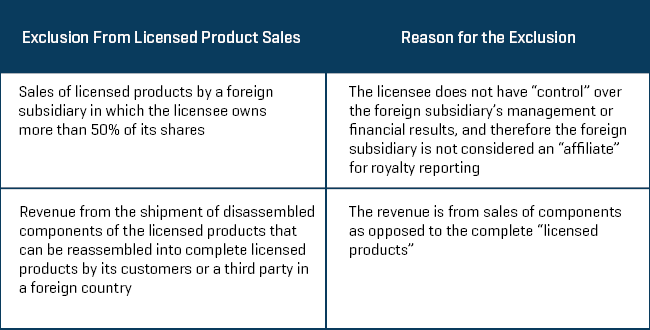Have You Gotten What You’ve Bargained For? Excluded Licensed Product Sales – Part 1
Have You Gotten What You’ve Bargained For? Excluded Licensed Product Sales – Part 1
When verifying compliance of a multinational licensee, licensors should investigate and understand any exclusion of licensees’ subsidiary or disassembled component revenue.
The definition of “net sales” is critical to a license agreement, as most, if not all, licensing professionals would agree. This is particularly true for a license with ongoing royalty obligations calculated on a percentage of net sales. To ensure proper royalty reporting, it is important for the licensor and licensee to have the same understanding on how the amount of net sales is determined.
I previously discussed real-world issues associated with the allowable deductions commonly included in the definition of the “net sales.” Here, I will focus on the quantification of sales of the products covered by the license agreement (“licensed product sales”). The definition of “net sales” generally includes the standard language such as “revenue received by the licensee and/or its affiliate(s) for sales of licensed products,” or “gross amount billed by licensee and/or its affiliate(s) for shipment of licensed products.” While both the “affiliate(s)” and “licensed product” are separate terms defined in the licensed agreement, in our experience we have seen creative interpretation of these terms by some licensees, as shown in the table below.

Do you know whether your licensee has excluded any subsidiary sales or disassembled component sales due to reasons similar to the above examples? The following are some tips to help answer that question:
-
Monitor company new releases, market research reports, or articles discussing your licensee’s geographic expansion or customer wins that potentially include the sales of the licensed products
-
Review the licensee’s annual and quarterly reports or other financial presentations for any discussion of expansion and wins as well as associated revenue increases
-
Communicate with your licensee periodically and initiate a discussion of such expansion or wins immediately if the trend of the sales amount in the royalty report is inconsistent with the publicly available information
As I noted in my prior article, many of the license agreements have a limited look-back period. Therefore, a delay in tending to these issues would likely result in getting less than what you have bargained for due to the inability to recover underpayment for periods outside of the look-back period.


